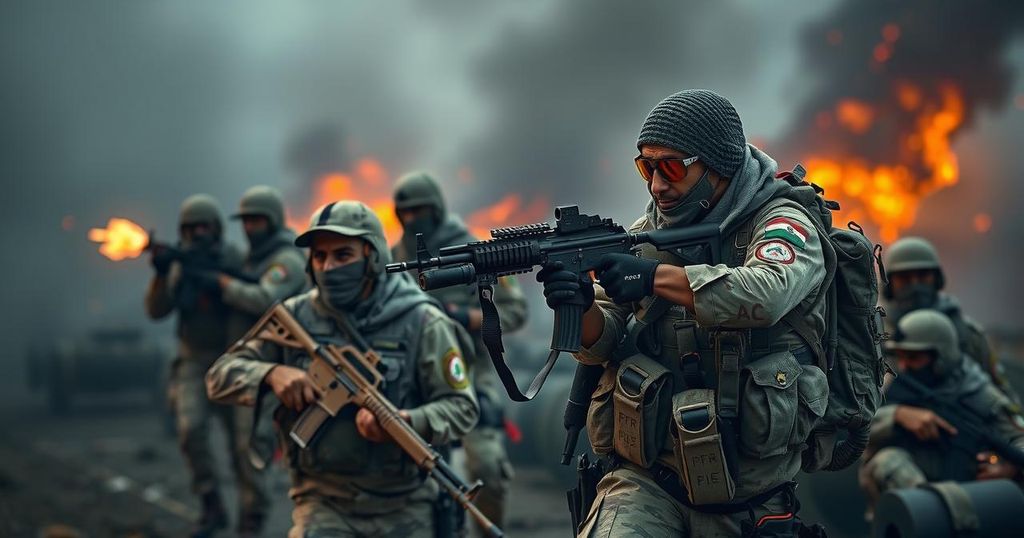World news
ALEPPO, ASIA, BASHA, BASHAR AL ASSAD, CIVILIAN CASUALTIES, CONFLICT, DRONE STRIKES, EUROPE, EUROPE/ASIA, FATEMIYOUN, HELMETS, HEZBOLLAH, IRAN, IRAQ, ISRAEL, KATIAB HEZBOLLAH, KATIE WILLIAMS, MILITARY OPERATIONS, MOSCOW, RUSSIA, SEAN BELL, SYRIA, TARTUS, UK, UKRAINE, VLADIMIR PUTIN, WAR
Sofia Rodriguez
0 Comments
Iran-Backed Forces Reinforce Assad Amidst Rising Rebel Offensive in Syria
Iran-backed militias have entered Syria to support President Bashar al-Assad amid a renewed rebel offensive, resulting in significant casualties from airstrikes. The conflict has intensified with the rebels taking control of Aleppo, raising concerns about the effectiveness of Assad’s forces and the implications of Russian military involvement.
Iran-backed militias have entered Syria to assist President Bashar al-Assad in countering a newly intensified rebel uprising, informed sources from the Syrian army have reported. In a series of air strikes conducted by Russian and Syrian forces, at least 25 individuals have died in northwestern Syria. The opposition rescue organization, White Helmets, documented the casualties amid claims that the airstrikes targeted civilian areas, particularly in the city of Idlib, which houses a significant population of displaced persons.
The conflict in Syria has seen a sudden resurgence as rebel forces, notably led by Hayat Tahrir al-Sham, launched a surprising offensive resulting in the capture of Aleppo, Syria’s second-largest city. This development has sparked debates concerning the preparedness and resilience of Assad’s military forces, which previously appeared to have established control over the region with Russian and Iranian support. Analysts indicate that a shift in Russia’s military focus towards matters in Ukraine has resulted in gaps in aerial support for the Syrian government, presenting an opportunity for rebel resurgence.
As Iranian-backed fighters advance into the northern regions of Syria from Iraq, these reinforcements are expected to enhance the capabilities of the Syrian military amidst ongoing air assaults. Recent reports highlight that rebels have taken significant territory and that the airstrikes—while claimed to target insurgent strongholds—have resulted in substantial civilian casualties, igniting fears of escalated violence across the region.
The Syrian government, following airstrikes, described attacks as necessary actions against insurgents, firmly denying civilian casualties. Meanwhile, President Assad asserted the government’s commitment to maintaining stability and territorial integrity. The ongoing civil war, riddled with complexities, escalates into a new chapter of violence, paving the way for further conflict in a war that has lasted more than a decade and resulted in the deaths of hundreds of thousands.
The Syrian civil war, which began in 2011 as a confrontation between anti-government protesters and President Bashar al-Assad’s regime, has evolved into a multi-faceted conflict with numerous local and international actors involved. While initially dominated by the rebellion, the conflict saw a significant turning point in 2015 with Russian intervention on behalf of the Assad government. In recent months, Syria has faced renewed violence as well-armed rebel forces launch unexpected offensives, sparking discussions about external influences including Iran’s militia support and Russian military tactics. The precarious situation reflects broader geopolitical interests and internal strife, particularly with the ongoing military confrontations affecting civilian populations and regional stability.
The re-entry of Iran-backed militias into Syria represents a significant shift in the ongoing civil war dynamics as the Assad regime faces challenges from a resurgent rebel faction. Recent airstrikes by Russian and Syrian forces underscore the escalation of military engagements, with notable civilian casualties documented amidst claims of targeting insurgent operations. The conflict continues to raise questions regarding the effectiveness of Assad’s forces and the international ramifications of renewed hostilities in a region already burdened by years of war and humanitarian strife.
Original Source: news.sky.com




Post Comment